#clinical trial
Text

Diabetes-beating Betas
Interim results of a clinical trial of pancreatic precursor cells encapsulated in a device as treatment for Type I diabetes: analysis of resulting β cell function and control of glucose levels
Read the published research paper here
Image from work by Bart Keymeulen and colleagues
Diabetes Research Center, Vrije Universiteit Brussel and Universitair Ziekenhuis Brussel, Brussels, Belgium
Image originally published with a Creative Commons Attribution 4.0 International (CC BY 4.0)
Published in Nature Biotechnology, November 2023
You can also follow BPoD on Instagram, Twitter and Facebook
#science#biomedicine#biology#type 1 diabetes#diabetes#beta cells#pancreas#clinical trial#immunofluorescence
8 notes
·
View notes
Text
Drug shows promise for slowing progression of rare, painful genetic disease
Media Advisory
Wednesday, April 3, 2024
NIH-supported clinical trial could lead to first effective treatment for ACDC disease.
What
A drug used to treat certain bone diseases shows promise for slowing the progression of a rare, painful genetic condition that causes excessive calcium buildup in the arteries, known as arterial calcification due to deficiency of CD73 (ACDC). These results are from…
View On WordPress
#arterial calcification due to deficiency of CD73”#Clinical trial#drug#NHLBI#nih#rare disease#RESEARCH#slows progression
0 notes
Text
Cancer is Killing Me
Financially, not literally. Sorry about the clickbait headline, but it’s for a good cause to get your attention to talk about cancer. We just had World Cancer Awareness Day on the 4th of February. I was certainly aware of my cancer when my dermatologist cut out a big chunk of my back fat to keep a melanoma from spreading where it shouldn’t spread. Get checked regularly for cancer.
That’s one…
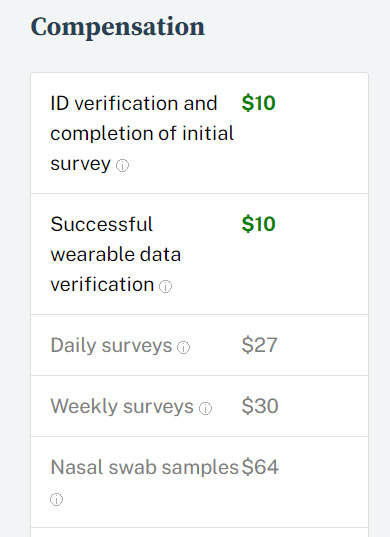
View On WordPress
0 notes
Link
What Does a Cancer Doula Do? https://www.cancerhealth.com/article/cancer-doula via @cancerhealthmag This concept is phenomenal, and I'd 100% utilize it during active treatment. My question is: How do we make this accessible to all? #cancerdoula
0 notes
Text

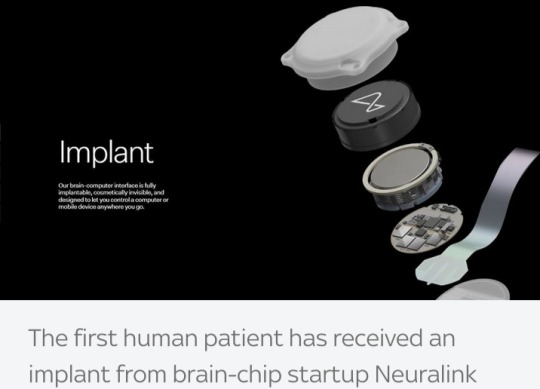


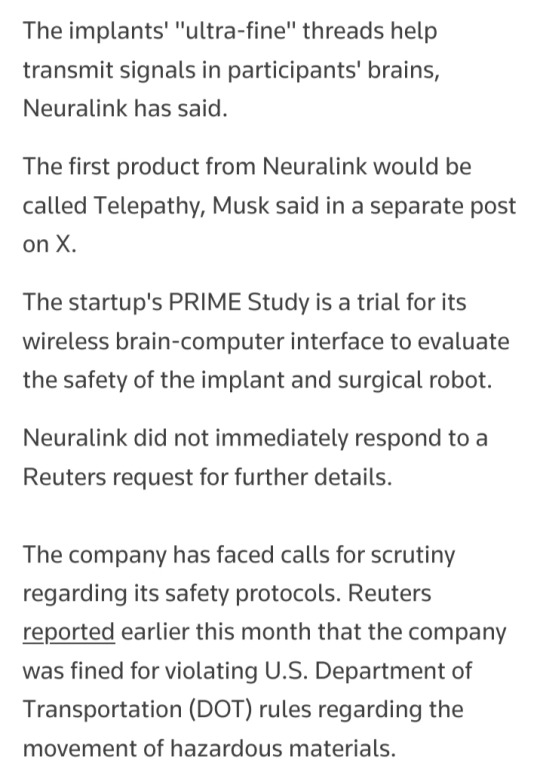
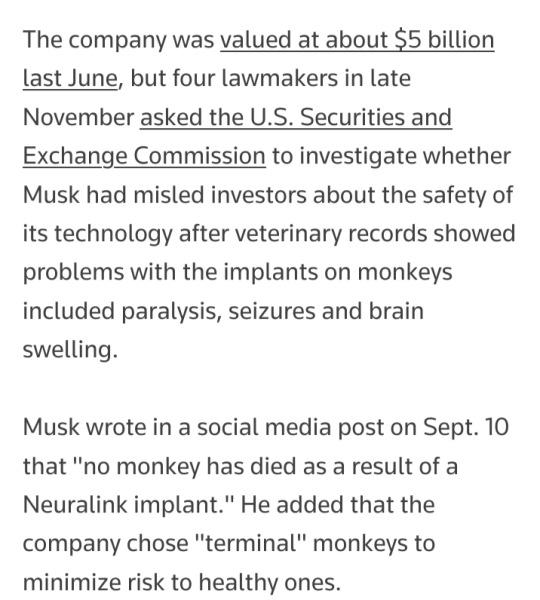
Source: Reuters
youtube
Elon Musk announces first Neuralink wireless brain chip implant in a human | BBC News
30 January 2024
Tech billionaire Elon Musk has said his company Neuralink has successfully implanted a wireless brain chip in a human for the first time.
He said initial results detected promising neuron spikes or nerve impulses and the patient is recovering well.
Posting on X, formerly known as Twitter, Mr Musk said Neuralink’s first product would be called Telepathy, and if successful, would enable "control of your phone or computer, and through them, almost any device, just by thinking."
While Mr Musk's involvement raises the profile of Neuralink, a number of rival companies have already implanted similar devices.
#Neuralink#Elon Musk#National Institute of Health#U.S. Food and Drug Administration#brain-computer interface (BCI) implant#Telepathy#PRIME Study#surgical robot#implant#neurological conditions#paralysis#brain#brain chip#technology#science#clinical trial#artificial intelligence#wireless brain chip#Youtube
1 note
·
View note
Text
TGN1412 Clinical Trial Incident
TGN1412 Clinical Trial Incident.
The TGN1412 clinical trial incident is an instructive case study in pharmaceutical science, highlighting critical aspects of clinical trial design, immunotherapy risks, and the importance of safety in first-in-human studies. This incident offers valuable insights, particularly for professionals in fields like genetic toxicology and pharmacology.
TGN1412 Clinical Trial Incident
TGN1412 Clinical…

View On WordPress
0 notes
Text
Cannabis News-NHS Research Committee Approves Cannabis Based Medicines Clinical Trials - UK
Hello lovelies I thought I’d share this promising news I shall be following with interest and will update you with all the news about this clinical trial. This is the first of its kind in the UK and very important step now that the NHS Research Committee has approved this trial. For my International subscribers I hope you can use these links if not let me know. They’re maybe an alternative I can…
View On WordPress
#Cannabis awareness#Cannabis based education#Cannabis Community#Cannabis Education#Cannabis News#cannabis patients#Clinical Trial#medical cannabis#medical cannabis awareness#medical cannabis flower#medicinal cannabis
0 notes
Text

Patient Recruitment Forecast Period | Market Size | 2035
The global clinical trial services market was valued at USD 9.4 billion in 2022. It is estimated to grow at a CAGR of 8.2% during the forecast period. The report features an extensive study of the current market size and future market growth of the patient recruitment market forecast period over the forecast period. Get a detailed insights report now!
0 notes
Text

The number of oncology indication approvals has been increasing steadily over the past 20 years. In 2000, there were 46 approvals, and by 2022, the number had increased to 573.
The majority of oncology indication approvals have been for New Molecular Entities (NMEs). NMEs are drugs that have not been previously approved for any indication. In 2022, 453 of the 573 approvals were for NMEs.
The most common type of oncology indication is for the treatment of solid tumours. In 2022, 492 of the 573 approvals were for the treatment of solid tumours.
The average approval time for an oncology indication is around 3 years. However, the approval time can vary depending on the type of drug and the complexity of the clinical trial data.
The cost of developing a new oncology drug is high. The average cost of developing a new oncology drug is estimated to be around $1 billion.
0 notes
Text
#Regulatory Medical Writing#publishing and submissions#ISE submissions#Clinical Trial#ISE#ISS#eCTD Specification#New Drug#Medical writers
0 notes
Text
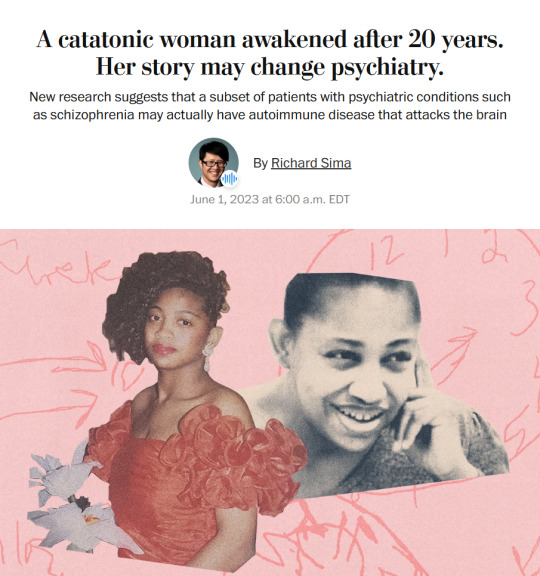
Story from the Washington Post here, non-paywall version here.
Washington Post stop blocking linksharing and shit challenge.
"The young woman was catatonic, stuck at the nurses’ station — unmoving, unblinking and unknowing of where or who she was.
Her name was April Burrell.
Before she became a patient, April had been an outgoing, straight-A student majoring in accounting at the University of Maryland Eastern Shore. But after a traumatic event when she was 21, April suddenly developed psychosis and became lost in a constant state of visual and auditory hallucinations. The former high school valedictorian could no longer communicate, bathe or take care of herself.
April was diagnosed with a severe form of schizophrenia, an often devastating mental illness that affects approximately 1 percent of the global population and can drastically impair how patients behave and perceive reality.
“She was the first person I ever saw as a patient,” said Sander Markx, director of precision psychiatry at Columbia University, who was still a medical student in 2000 when he first encountered April. “She is, to this day, the sickest patient I’ve ever seen.” ...
It would be nearly two decades before their paths crossed again. But in 2018, another chance encounter led to several medical discoveries...
Markx and his colleagues discovered that although April’s illness was clinically indistinguishable from schizophrenia, she also had lupus, an underlying and treatable autoimmune condition that was attacking her brain.
After months of targeted treatments [for lupus] — and more than two decades trapped in her mind — April woke up.
The awakening of April — and the successful treatment of other people with similar conditions — now stand to transform care for some of psychiatry’s sickest patients, many of whom are languishing in mental institutions.
Researchers working with the New York state mental health-care system have identified about 200 patients with autoimmune diseases, some institutionalized for years, who may be helped by the discovery.
And scientists around the world, including Germany and Britain, are conducting similar research, finding that underlying autoimmune and inflammatory processes may be more common in patients with a variety of psychiatric syndromes than previously believed.
Although the current research probably will help only a small subset of patients, the impact of the work is already beginning to reshape the practice of psychiatry and the way many cases of mental illness are diagnosed and treated.
“These are the forgotten souls,” said Markx. “We’re not just improving the lives of these people, but we’re bringing them back from a place that I didn’t think they could come back from.” ...
Waking up after two decades
The medical team set to work counteracting April’s rampaging immune system and started April on an intensive immunotherapy treatment for neuropsychiatric lupus...
The regimen is grueling, requiring a month-long break between each of the six rounds to allow the immune system to recover. But April started showing signs of improvement almost immediately...
A joyful reunion
“I’ve always wanted my sister to get back to who she was,” Guy Burrell said.
In 2020, April was deemed mentally competent to discharge herself from the psychiatric hospital where she had lived for nearly two decades, and she moved to a rehabilitation center...
Because of visiting restrictions related to covid, the family’s face-to-face reunion with April was delayed until last year. April’s brother, sister-in-law and their kids were finally able to visit her at a rehabilitation center, and the occasion was tearful and joyous.
“When she came in there, you would’ve thought she was a brand-new person,” Guy Burrell said. “She knew all of us, remembered different stuff from back when she was a child.” ...
The family felt as if they’d witnessed a miracle.
“She was hugging me, she was holding my hand,” Guy Burrell said. “You might as well have thrown a parade because we were so happy, because we hadn’t seen her like that in, like, forever.”
“It was like she came home,” Markx said. “We never thought that was possible.”
...After April’s unexpected recovery, the medical team put out an alert to the hospital system to identify any patients with antibody markers for autoimmune disease. A few months later, Anca Askanase, a rheumatologist and director of the Columbia Lupus Center,who had been on April’s treatment team, approached Markx. “I think we found our girl,” she said.
Bringing back Devine
When Devine Cruz was 9, she began to hear voices. At first, the voices fought with one another. But as she grew older, the voices would talk about her, [and over the years, things got worse].
For more than a decade, the young woman moved in and out of hospitals for treatment. Her symptoms included visual and auditory hallucinations, as well as delusions that prevented her from living a normal life.
Devine was eventually diagnosed with schizoaffective disorder, which can result in symptoms of both schizophrenia and bipolar disorder. She also was diagnosed with intellectual disability.
She was on a laundry list of drugs — two antipsychotic medications, lithium, clonazepam, Ativan and benztropine — that came with a litany of side effects but didn’t resolve all her symptoms...
She also had lupus, which she had been diagnosed with when she was about 14, although doctors had never made a connection between the disease and her mental health...
Last August, the medical team prescribed monthly immunosuppressive infusions of corticosteroids and chemotherapy drugs, a regime similar to what April had been given a few years prior. By October, there were already dramatic signs of improvement.
“She was like ‘Yeah, I gotta go,’” Markx said. “‘Like, I’ve been missing out.’”
After several treatments, Devine began developing awareness that the voices in her head were different from real voices, a sign that she was reconnecting with reality. She finished her sixth and final round of infusions in January.
In March, she was well enough to meet with a reporter. “I feel like I’m already better,” Devine said during a conversation in Markx’s office at the New York State Psychiatric Institute, where she was treated. “I feel myself being a person that I was supposed to be my whole entire life.” ...
Her recovery is remarkable for several reasons, her doctors said. The voices and visions have stopped. And she no longer meets the diagnostic criteria for either schizoaffective disorder or intellectual disability, Markx said...
Today, Devine lives with her mother and is leading a more active and engaged life. She helps her mother cook, goes to the grocery store and navigates public transportation to keep her appointments. She is even babysitting her siblings’ young children — listening to music, taking them to the park or watching “Frozen 2” — responsibilities her family never would have entrusted her with before her recovery.
Expanding the search for more patients
While it is likely that only a subset of people diagnosed with schizophrenia and psychotic disorders have an underlying autoimmune condition, Markx and other doctors believe there are probably many more patients whose psychiatric conditions are caused or exacerbated by autoimmune issues...
The cases of April and Devine also helped inspire the development of the SNF Center for Precision Psychiatry and Mental Health at Columbia, which was named for the Stavros Niarchos Foundation, which awarded it a $75 million grant in April. The goal of the center is to develop new treatments based on specific genetic and autoimmune causes of psychiatric illness, said Joseph Gogos, co-director of the SNF Center.
Markx said he has begun care and treatment on about 40 patients since the SNF Center opened. The SNF Center is working with the New York State Office of Mental Health, which oversees one of the largest public mental health systems in America, to conduct whole genome sequencing and autoimmunity screening on inpatients at long-term facilities.
For “the most disabled, the sickest of the sick, even if we can help just a small fraction of them, by doing these detailed analyses, that’s worth something,” said Thomas Smith, chief medical officer for the New York State Office of Mental Health. “You’re helping save someone’s life, get them out of the hospital, have them live in the community, go home.”
Discussions are underway to extend the search to the 20,000 outpatients in the New York state system as well. Serious psychiatric disorders, like schizophrenia, are more likely to be undertreated in underprivileged groups. And autoimmune disorders like lupus disproportionately affect women and people of color with more severity.
Changing psychiatric care
How many people ultimately will be helped by the research remains a subject of debate in the scientific community. But the research has spurred excitement about the potential to better understand what is going on in the brain during serious mental illness...
Emerging research has implicated inflammation and immunological dysfunction as potential players in a variety of neuropsychiatric conditions, including schizophrenia, depression and autism.
“It opens new treatment possibilities to patients that used to be treated very differently,” said Ludger Tebartz van Elst, a professor of psychiatry and psychotherapy at University Medical Clinic Freiburg in Germany.
In one study, published last year in Molecular Psychiatry, Tebartz van Elst and his colleagues identified 91 psychiatric patients with suspected autoimmune diseases, and reported that immunotherapies benefited the majority of them.
Belinda Lennox, head of the psychiatry department at the University of Oxford, is enrolling patients in clinical trials to test the effectiveness of immunotherapy for autoimmune psychosis patients.
As a result of the research, screenings for immunological markers in psychotic patients are already routine in Germany, where psychiatrists regularly collect samples from cerebrospinal fluid.
Markx is also doing similar screening with his patients. He believes highly sensitive and inexpensive blood tests to detect different antibodies should become part of the standard screening protocol for psychosis.
Also on the horizon: more targeted immunotherapy rather than current “sledgehammer approaches” that suppress the immune system on a broad level, said George Yancopoulos, the co-founder and president of the pharmaceutical company Regeneron.
“I think we’re at the dawn of a new era. This is just the beginning,” said Yancopoulos."
-via The Washington Post, June 1, 2023
#mental illness#schizophrenia#schizoaffective#psychotic disorders#psychology#neurology#autoimmune#autoimmine disease#neuroscience#medical news#medical research#catatonia#immunotherapy#immune system#clinical trials#good news#hope
6K notes
·
View notes
Text
my twenty- sixth trip around the sun
26 was hard. But not in the way the last couple years were.
My life is running on two parallels right now. One of grateful-ness, and one of pure broken-heart-ness.
My health is starting to stabilize. And I’m figuring out my new normal. (Yay!)
But, during the last year I lost my two best friends. My grandparents. My world will never be the same. I’ll miss them forever & always. I’ll forever…

View On WordPress
#26#27#aunt#auntie#birthday#chronic#chronic illness#Chronic Illness Warrior#Chronic Pain Warrior#circuit#clinical trial#clinical trials#comeback#disability#FOP#grandparents#grief#health#health struggles#highlights#iFOPa#Life#loss#missing piece#new normal#new self#parallels#physical disability#positives#proud
0 notes
Text
I survived 2 Mageddons
The past week was rough. First, we had Snowmageddon a week ago. I paid the price physically. Those 3 days of heavy snow and subsequent back-breaking snow removal were followed by 3 days of Coldmageddon. I paid the price mentally on those cold days. The 3 days of Coldmageddon were not the coldest Chicagoland has ever seen, but they were brutal, down to -16F/-26.7C overnight. Highs during the day…

View On WordPress
#cancer#chicago#clinical trial#cold#cold water swimming#coldmageddon#colonoscopy#comedy#exercise#funny#health#humor#snow#snowmageddon#swimming#winter
0 notes
Text
Willingness to participate in clinical trials: A cross-sectional analysis in Ho Chi Minh City, Vietnam
Article published in J. Pharm. Pharmacogn. Res., vol. 10, no. 5, pp. 791-799, September-October 2022.
DOI: https://doi.org/10.56499/jppres22.1403_10.5.791
Thoai N. Dang, Tran T.T. Bao, Chau N.D. Quynh, Trung V. Quang*
Faculty of Pharmacy, Pham Ngoc Thach University of Medicine, Ho Chi Minh City, 700000, Vietnam.
*E-mail: [email protected]
Abstract
Context: Clinical trial is an experiment…

View On WordPress
0 notes
Text
Crux Biolabs
Crux Biolabs operates a laboratory for vaccines, immunotherapies, immuno-oncology, and infectious diseases. The firm conducts specialist immunology contract research services for pre-clinical and clinical studies, as well as academic and biotech R&D, through its NATA accredited facility in Melbourne. It was founded in 2011 and is based in Bayswater, Victoria.
#Clinical trial#Immunology#Cytokine#Flow cytometry#ELISA#array#FACS#CRO#Biolab#Biolabs#Us biolabs in Australia#Biomarker#EliSpot#Immunogenicity#Contract research
0 notes